Buildings and Green Areas
Setting and Infrastructure (SI)
Dokuz Eylül University conducts its academic and research activities across 20 distinct locations within the province. The institution encompasses 18 faculties, 10 institutes, 1 conservatory, and 8 vocational schools, in addition to 49 application and research centers, which include a Research Hospital as well as an Oral and Dental Health Practice and Research Center. The university’s principal campuses are located in the Buca district, comprising the Central Campus (4.5 million m²), the Faculty of Education Campus (110,265 m²), and the Dokuzçeşmeler Campus (76,148 m²).
The Central Campus, formerly known as Tınaztepe Campus, is recognized as the main and largest campus of DEU which hosts a wide spectrum of academic units. In the field of social sciences and humanities, it accommodates the Faculty of Literature, the Faculty of Law, the Faculty of Management, the Faculty of Tourism, the School of Foreign Languages, the Vocational School of Law, the Institute of Social Sciences, and the Institute of Atatürk Principles and History of Revolution. In the area of science and engineering, the campus includes the Faculty of Science, the Faculty of Engineering, the Faculty of Architecture, and the Graduate School of Applied and Natural Sciences. In the domain of arts and culture, it houses the Faculty of Fine Arts, the Institute of Fine Arts, and the State Conservatory. Finally, in the field of specialized disciplines, the campus hosts the Faculty of Maritime Affairs.

The Faculty of Education has its own campus in Buca, while the Faculty of Economics and Administrative Sciences is located at Dokuzçeşmeler Campus. In İnciraltı, the 15 Temmuz Health and Art Campus (332,191 m²) houses the Faculty of Medicine, Faculty of Dentistry, Faculty of Nursing, Faculty of Physical Therapy and Rehabilitation, International Institute of Biomedicine and Genomics, Oncology Institute, and the Institute of Health Sciences.


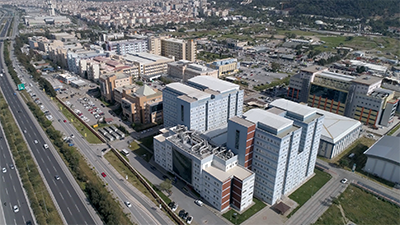
Other university units are located across various campuses. The Faculty of Theology and the Research Center of Theological Sciences are based at Hatay Campus (33,059 m²), the Institute of Marine Science and Technology at İnciraltı Campus (2,766 m²), and Nejat Hepkon Faculty of Sports Sciences at Seferihisar Campus (4,858 m²). Additionally, the Vocational School of Bergama operates at Bergama Campus (171,928 m²), Efes Vocational School at Selçuk Campus (7,455 m²), Torbalı Vocational School at Torbalı Campus (76,826 m²), and the Veterinary Faculty at Kiraz Campus (1,949 m²).
In addition to its main campuses, the university maintains several significant facilities, such as the Sabancı Cultural Palace in Konak, the Çakalburnu Center of Excellence in Urla, the Seferihisar Training Center, and student dormitories located in both Buca and Seferihisar. The Rectorate of the university is currently situated in Alsancak, occupying an area of 14,321 m², and also houses DEDAM (the Application and Research Center of Language Education), which extends over 13,376 m².
Total campus area (m2)
Dokuz Eylul University (DEU) continues its services on a total area of 5.535.433,86 m2 in terms of land and land area, according to its ownership status
| UNIVERSITY CAMPUSES | |
| Campus Name
|
Total Area (m2) |
| Central ( formerly Tınaztepe ) Campus | 4.500.000,00 |
| Faculty of Education Campus | 110.265,00 |
| Dokuzçeşmeler Campus | 76.148,00 |
| 15 Temmuz Health and Art Campus | 332.190,83 |
| İnciraltı Campus (Institute of Marine Sciences and Technology) | 27.666,00 |
| Hatay Campus (Faculty of Theology) | 33.059,00 |
| Alsancak (Rectorate) | 14.321,00 |
| Alsancak (DEDAM) | 13.376,21 |
| Konak (Hotel Dokuz Eylül) | 584,00 |
| Konak (Sabancı Culture Palace ) | 1.667,50 |
| Buca (Evka-1 / Student Dormitory) | 17.176,76 |
| Seferihisar Campus (Fevziye Hepkon Sports Sciences App. and Res. Center ) | 9.045,22 |
| Seferihisar Campus (Necat Hepkon Faculty of Sports Sciences.) | 4.858,41 |
| Bergama Campus (Bergama Vocational School) | 171.928,00 |
| Urla (Naval Training center) | 8.840,00 |
| Selçuk Campus (Efes Vocational School) | 7.455,00 |
| Torbalı Campus (Torbalı Vocational School) | 76.826,00 |
| Seferihisar Training Facilities | 17.677,52 |
| Kiraz Campus (Veterinary Faculty ) | 1.949,00 |
| Kiraz Chicken Farm Land | 2.566,00 |
| Kiraz Marketplace Land | 1.022,00 |
| Kiraz Yenimahalle
|
4.100,00 |
| Kiraz- Hisar | 604,00 |
| Aliağa Occupational and Environmental Diseases Hospital Land | 102.108,41 |
| TOTAL | 5.535.433,86 |
*Immovables belonging to the University that are still in the state of land
Total area on campus covered in forest vegetation
All forested areas at Dokuz Eylul University serve as outdoor classrooms and research spaces where students and scientists conduct ecological studies and collect data. Camera traps installed across forest zones continuously record local wildlife, helping protect biodiversity and support sustainable ecosystem management. Through the EU PRIMA ValueFarm Project (ended in 2025), researchers analyzed wild plant species from campus ecosystems to explore their potential in sustainable agriculture and land restoration.
Additionally, the Department of Environmental Engineering’s Air Pollution Laboratory conducts long-term monitoring of air quality at Tınaztepe Campus, tracking pollutants like SO₂, NOₓ, and O₃, along with meteorological conditions, to aid urban sustainability and climate policy. Fieldwork and topography labs provide students with practical training in geodetic measurements, surveying, and mapping, enhancing both their technical and environmental literacy.
Altogether, DEU integrates education, research, and environmental protection into a unified model of sustainability, acting as a living laboratory for sustainable development.
Forested areas cover approximately 3,111,315 m², making up 56.2% of the total campus area.
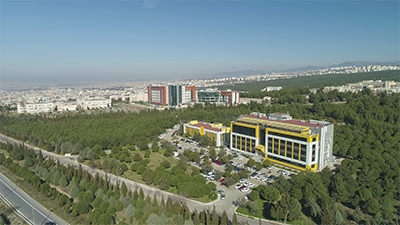
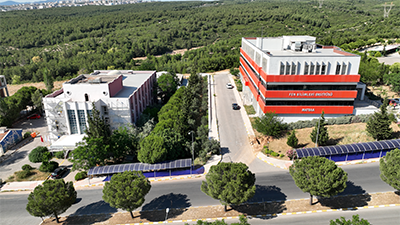
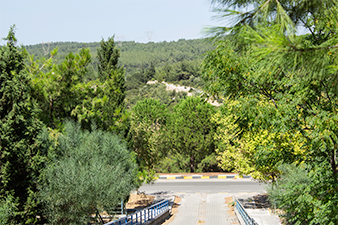

Total area on campus covered in planted vegetation
Forested areas occupy a large portion of DEU campuses, providing rich natural landscapes and ecological value. Alongside these forests, cultivated lands are also extensive, significantly contributing to the remarkable diversity of plant species across the campuses. Every campus hosts a variety of green spaces, which not only enhance the visual appeal of the environment but also serve educational and research purposes. Through projects aimed at crop cultivation, initiatives designed to enrich the vegetation cover, and continuous afforestation programs, the total cultivated land area has reached 685.919 m². This figure corresponds to 12.4% of the total campus area, highlighting the university’s strong commitment to sustainability, biodiversity, and the integration of natural spaces into academic life.
Total area on campus for water absorption besides the forest and planted vegetation
In addition to forested and planted vegetation, the total water-absorbing area amounts to approximately 613.921 m², which includes deforested lands and soil surfaces. On the campuses, all hard-surfaced areas—such as building surroundings, parking lots, and sidewalks—are covered with water-permeable interlocking parquet, with the exception of vehicle roads. Vehicle roads themselves cover 227.579 m², while the remaining 77.550 m² of hard surfaces are water-absorbent. Consequently, the overall water-absorbent area reaches 1.384.477 m², corresponding to 25% of the total campus area.
The total open space area divided by the total campus population
The open space area per person in our campus is reported as 73,33 m2 /person.
Campus facilities for disabled, special needs and or maternity care
Dokuz Eylül University’s Disabled Student Coordination Unit (Engelsiz DEÜ), established in 2009, ensures the equal participation of students with disabilities in higher education, coordinating academic, social, administrative, and physical support. Campuses are arranged in compliance with TS 9111 accessibility standards.
The Prof. Dr. Fuat Sezgin Central Library provides digital course materials, audio books, Braille resources, tactile graphics, audio description, accessible study rooms, and two professional audio recording units. An Induction Loop System is available in several buildings for hearing-impaired students, while an Audio Guidance System supports visually-impaired students across multiple campuses. Seferihisar Student Training and Recreation Facilities also include spatial accessibility features.
Across DEU campuses, there are 92 ramps, 53 elevators, 72 accessible restrooms, 88 accessible entrances, 13 wheelchairs, and 21 reserved parking spaces. Two of the eight campus shuttle buses are wheelchair-accessible, and routes are adjusted according to students’ needs. Students with a disability rate of 40% or higher receive priority during dormitory registration.
DEU offers academic accommodations, accessible learning materials, counseling, peer support, accessible social-cultural activities, and accessible housing and transportation.
Preschool education for the children of DEU staff (ages 3-6) is provided at Buca Tınaztepe and the Faculty of Education campuses, while DEU 75th Year Schools on Tınaztepe Campus host around 50 children with discounted fees for DEU personnel. Built on 30,000 m², the DEU 75th Year Primary School provides a safe, green, accessible learning environment and also accepts students from outside the university within capacity limits.
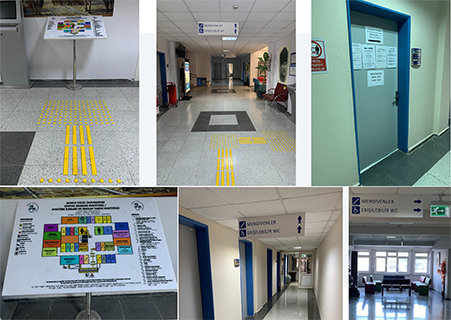

Security and safety facilites
At Dokuz Eylul University, the Directorate of Protection and Security, operating under the General Secretariat, is responsible for ensuring campus safety. The unit works in accordance with the Directive on the Implementation of Security Services, issued in 2017. Its main duty is to protect the university’s buildings, social areas, gardens, vehicles, and equipment while ensuring the safety of people and property. The department uses modern technology to maintain high service quality and effective security. Access to university campuses is controlled by student and staff ID cards, and vehicle entry is managed through Fast Pass tags issued only to university personnel and students.
All buildings across Dokuz Eylul University campuses are equipped with comprehensive closed-circuit camera systems (CCTV) that monitor both indoor and outdoor areas. To strengthen safety measures, the campuses are also fitted with a network of panic buttons, fire alarms, and fire extinguishing systems strategically placed throughout all facilities.
Each corridor is equipped with fire alarms and extinguishers, ensuring a rapid and coordinated response in case of emergencies. The expiration and maintenance dates of fire extinguishers are checked regularly, and the cylinders are refilled or replaced as needed, depending on their condition. Through this systematic monitoring, the university maintains a high level of safety and preparedness across all campuses.
Access to all buildings on the Dokuz Eylul University campuses is regulated by barrier systems, which require student or staff cards for entry. Implemented in the 2021-2022 academic year, this measure was a precautionary response to the heightened risk associated with the Covid-19 pandemic. Today, these systems provide strong security by effectively limiting access, ensuring that only students and authorized personnel can enter the buildings.
At Dokuz Eylul University’s largest campus, Central (Tınaztepe) Campus, a firefighting vehicle is available to ensure rapid response during emergencies. The vehicle has a 6-ton water capacity and a ladder that can reach up to 10.5 meters, allowing quick and effective intervention in case of fire. Its strategic location within the campus enables it to reach different areas within minutes, minimizing potential risks to life and property. In addition, a security vehicle on the campus is equipped with a special fire suppression system designed for small-scale fires. Operating at 150 bar pressure, the system has a capacity of 30 liters of foam and 100 liters of water, and a 25-meter hose that allows access to narrow or hard-to-reach areas. This equipment strengthens campus safety measures and helps create a safer environment for students and staff.
Health infrastructure facilities for students, academics and administrative staffs’ wellbeing
Dokuz Eylul University Hospital, established in 1982, is one of the most well-established university hospitals in İzmir. Operating in close integration with the Faculty of Medicine, it not only provides healthcare services but also carries out education and research activities. In addition to serving patients, DEU Hospital functions as a practical training ground for medical students and resident physicians undergoing specialization training. The hospital does not solely serve the local community; it also provides healthcare services to the university’s staff and students.
Established in 2018, DEU Hospital’s Traditional and Complementary Medicine Center offers the public alternative diagnostic and treatment options under the guidance of certified specialists. In 2022, the Medical Aesthetics and Cosmetology Unit was opened within the Dermatology Department at the DEU 15 Temmuz Health and Art Campus, providing care for conditions like hair loss, acne, and excessive sweating, as well as cosmetic services such as skincare, chemical peels, and Botox. Both centers serve students and the broader community. The University’s Oral and Dental Health Application and Research Center opened in January 2022, offering services to university members, students, and the public under social security provisions.
In the summer of 2021, the Tınaztepe Polyclinics, which previously offered a limited range of services, was renovated and now provides a wide array of health services. Dokuz Eylül University (DEÜ) Tınaztepe Polyclinic was established within the Tınaztepe Campus to provide healthcare services to students, academic and administrative staff, as well as the local community. In 2024, the polyclinic served 1,237 students and 1,557 staff members. In addition to general health services, it offers basic examinations, diagnostic tests, and referral services. A standby ambulance is always available and used when necessary. Located at the largest campus of the university, the Merkez Campus, the Tınaztepe Polyclinic ensures quick, accessible, and reliable medical care, supporting the overall well-being of the university community.
DEU students can register with the Family Health Care Unit of the Faculty of Medicine or seek healthcare services in their local districts to receive free consultations.
All DEU buildings and departments are equipped with first aid kits, and emergency units are located within a 5-minute driving distance.
Conservation: plant, animal, and wildlife, genetic resources for food and agriculture secured in either medium or long-term conservation facilities
The Central Campus of Dokuz Eylul University harbors remarkable biological diversity, functioning as a natural laboratory within an urban setting. The flora of the campus includes a wide variety of species ranging from forest trees such as oak (Quercus spp.), pine (Pinus spp.), and olive (Olea europaea) to numerous shrubs and herbaceous plants. Particularly noteworthy are the presence of rare and ecologically valuable orchids, including Anacamptis pyramidalis, Ophrys lutea, and Ophrys speculum, alongside extensive representatives of the Fabaceae, Rosaceae, Asteraceae, and Lamiaceae families. Furthermore, culturally significant tree species such as fig (Ficus carica), pomegranate (Punica granatum), almond (Amygdalus communis), and loquat (Eriobotrya japonica) contribute to the ecological and landscape character of the campus.
The fauna of the campus is equally diverse, encompassing Bufotes viridis (European Green Toad) among amphibians, and a range of reptiles such as Chamaeleo chamaeleon (Common Chameleon), Laudakia stellio (Stellion), and Montivipera xanthina (Ottoman Viper). Avian diversity is rich, with species such as the Rock Pigeon (Columba livia), Hoopoe (Upupa epops), Short-toed Snake Eagle (Circaetus gallicus), Common Buzzard (Buteo buteo), European Robin (Erithacus rubecula), Common Blackbird (Turdus merula), and House Sparrow (Passer domesticus) frequently observed. Mammalian species documented on campus include Sciurus anomalus (Persian Squirrel), Lepus europaeus (European Hare), Erinaceus concolor (Eastern Hedgehog), Vulpes vulpes (Red Fox), Canis aureus (Golden Jackal), Martes foina (Stone Marten), and Sus scrofa (Wild Boar).
This richness of flora and fauna highlights the Central Campus not only as an academic and research environment but also as an important natural heritage site whose conservation is essential for biodiversity and sustainability.
The University is deeply committed to protecting the local ecosystems found on its campuses. To support this mission, it has created various organizations and student groups, such as the Fauna and Flora Research and Application Center, the Environmental Research and Application Center, and the GENÇ TEMA Student Society, which focuses on combating erosion and safeguarding natural resources. Furthermore, the university includes the Nature Sports and Wildlife Observation student Society, Nature and Bird Watching Student Society, and Biodiversity and Environment Student Society. These societies carry out awareness and action projects aimed at protecting natural life in the campuses.
To protect biodiversity, the campus management policy was made with help from university experts in plants and animals. This plan focuses on caring for nature to help vulnerable species. For example, keeping natural ground cover in forests helps preserve trees and supports the plants and animals living there.
Several actions are being taken to protect the plants and animals on DEU campuses. Narrow walking paths will be created to prevent damage to the dense plant life. Also, bird nesting sites are being set up in trees to keep breeding birds safe and encourage more bird species to live on the Tınaztepe Central Campus. These efforts will help maintain a healthy ecosystem. At the same time, camera traps are placed in various parts of the campus forests, and animals in the natural environment are observed and studied.
Dokuz Eylul University is committed to being an institution that prioritizes sustainability and aims to coexist harmoniously with nature. At DEU, regular collaborations are established with local non-governmental organizations to improve the welfare of animals living on the streets. There are many feeding and watering stations throughout the campus for stray dogs and cats that live in harmony with the campus community. Additionally, active work is done with public authorities to ensure the vaccination of these street animals. A prime example of this is the Veterinary Faculty of DEU, which contributes to education and social awareness at every stage, aligned with its mission of environmental health and protection. Through laboratory facilities and farming conditions, observations and solutions are developed for all environmental issues, including the conservation of local flora and fauna. Sensitivity to environmental health is transformed into social contributions through a holistic approach, focusing on raising awareness and prevention of zoonotic diseases, rehabilitating stray animals, improving their living standards, and supporting plant production.
The DEU Flora and Fauna Research Center has developed a comprehensive reference work that serves as an atlas illustrating the rich biodiversity across the university’s campuses. This publication documents the plant and animal species identified within DEU’s natural habitats and aims to enhance awareness of campus ecology and environmental conservation. The electronic version of the atlas has been officially registered with the ISBN number 978-975-441-606-0, ensuring its accessibility and scientific credibility as a permanent resource for research and education.

